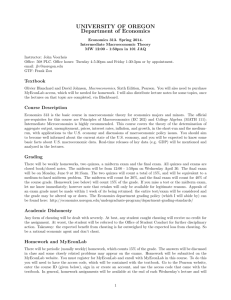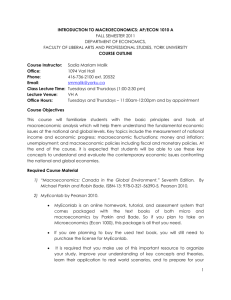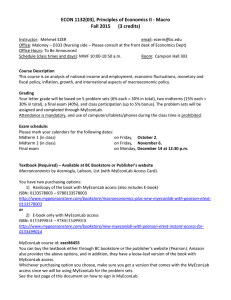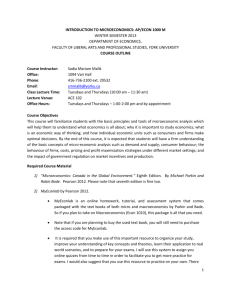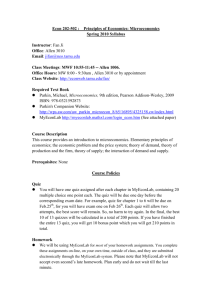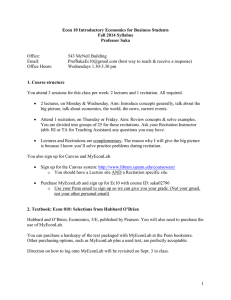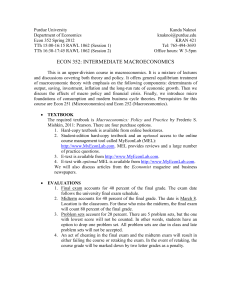Office: 543 McNeil Building Phone:
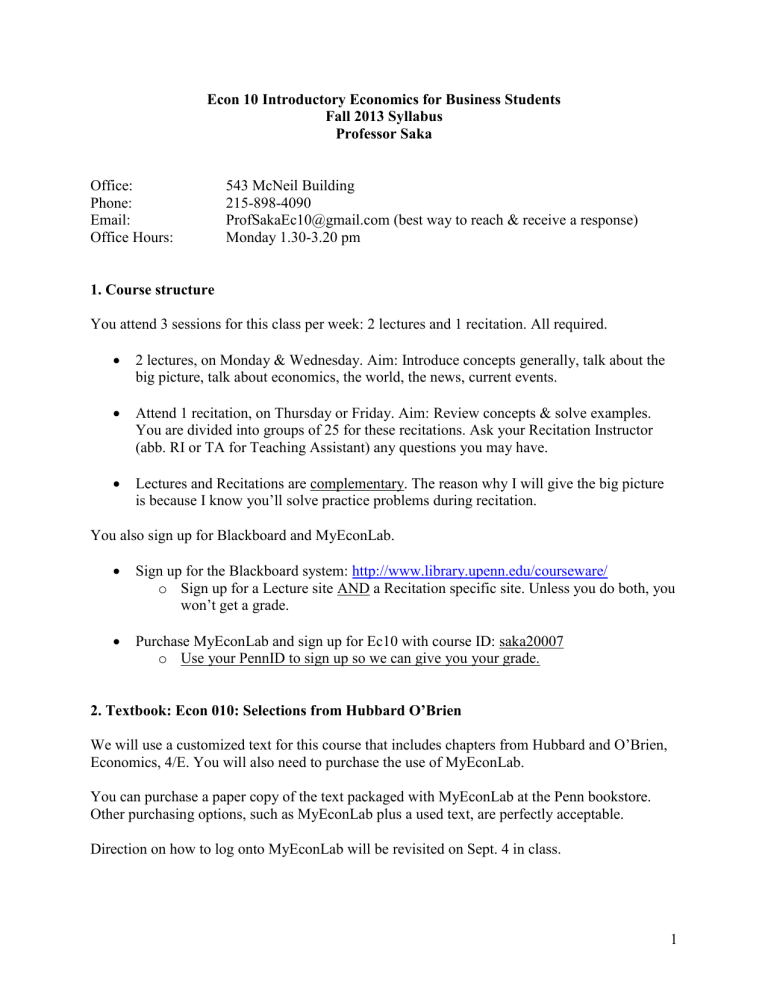
Office:
Phone:
Email:
Office Hours:
Econ 10 Introductory Economics for Business Students
Fall 2013 Syllabus
Professor Saka
543 McNeil Building
215-898-4090
ProfSakaEc10@gmail.com (best way to reach & receive a response)
Monday 1.30-3.20 pm
1. Course structure
You attend 3 sessions for this class per week: 2 lectures and 1 recitation. All required.
2 lectures, on Monday & Wednesday. Aim: Introduce concepts generally, talk about the big picture, talk about economics, the world, the news, current events.
Attend 1 recitation, on Thursday or Friday. Aim: Review concepts & solve examples.
You are divided into groups of 25 for these recitations. Ask your Recitation Instructor
(abb. RI or TA for Teaching Assistant) any questions you may have.
Lectures and Recitations are complementary. The reason why I will give the big picture is because I know you’ll solve practice problems during recitation.
You also sign up for Blackboard and MyEconLab.
Sign up for the Blackboard system: http://www.library.upenn.edu/courseware/ o Sign up for a Lecture site AND a Recitation specific site. Unless you do both, you won’t get a grade.
Purchase MyEconLab and sign up for Ec10 with course ID: saka20007 o Use your PennID to sign up so we can give you your grade.
2. Textbook: Econ 010: Selections from Hubbard O’Brien
We will use a customized text for this course that includes chapters from Hubbard and O’Brien,
Economics, 4/E. You will also need to purchase the use of MyEconLab.
You can purchase a paper copy of the text packaged with MyEconLab at the Penn bookstore.
Other purchasing options, such as MyEconLab plus a used text, are perfectly acceptable.
Direction on how to log onto MyEconLab will be revisited on Sept. 4 in class.
1
3. What is economics?
Economics is the study of how society allocates its scarce resources.
Microeconomics is the study of the behavior of households and firms, whose collective decisions determine how resources are allocated in a free market economy. We will study when markets are likely to produce “efficient” outcomes, and when government intervention may improve on or harm the competitive market outcome. We will use economic theory to analyze issues like a gas tax to change reliance on oil, minimum wages to increase salaries of the working poor, and government subsidies to increase education.
Macroeconomics is the study of the economy as a whole, and in an election year, it’s amazing to study topics that are relevant to our everyday life. We will understand how the size of the US economy is determined, how unemployment is measured, how inflation affects life. We will look at policy options that the government and the Federal Reserve Bank face, and discuss pros and cons of their actions.
Economic arguments are often used in debates about government policies, discussion of business strategies, and many of life’s other arenas. The goal of the course is to teach you to “think like an economist,” which I hope will help you to understand the world around you, make better economic decisions in your own life, and be a more informed citizen and voter.
4. Grading:
There are two methods used to calculate the course grade; we will choose for you the method gives you the higher letter grade. This system favors you and mitigates the effects of one-time poor performance.
Method 1: For those who show consistent progress
Quizzes (best 3 out of 4) 15% of course grade
MyEconLab work (homework) 15% of course grade
Midterm exam
Final exam
35% of course grade
35% of course grade
Method 2: For those who show improvement over the semester
Quizzes (best 3 out of 4) 15% of course grade
MyEconLab work (homework) 15% of course grade
Midterm exam
Final exam
30% of course grade
40% of course grade
Your letter grade is NOT based on a curve, it’s based on attainment.
90s => A range (A-, A, A+)
80s => B range (B-, B, B+)
70s => C range (C-, C, C+)
60s and below => D and F
2
4. a. Quizzes:
There will be four quizzes, taken in lecture, as indicated in the course schedule. No books or notes may be used during the quiz. Students must take the quiz during the lecture time in which they are enrolled or there will be a 10% grade deduction.
At the end of the semester, the top 3 quiz scores will be used towards the final course grade (i.e. the worst quiz score, including noshows, will be dropped). There are no make-ups for quizzes for any reason.
4. b. Homework: MyEconLab (15% of grade):
Homework is assigned (almost weekly) on-line via MyEconLab. While quizzes and exams are designed to evaluate mastery of course material, homework assignments are designed as learning processes.
As such regular assignments will posted and our expectation is that students will complete all assignments in a full & timely manner.
MyEconLab keeps track of how you answer homework questions and, through its study plan feature, recommends additional questions to help you brush-up on topics where you need to do more work. Students are strongly encouraged to strengthen their grasp of the course material by working with MyEconLab's sample test and study plan features. Homework assignments, sample tests and study plan questions closely match chapters in the textbook.
The first assignment is due Wednesday September 11th th
at 9am. Check this syllabus for other due dates, which are already determined to make time management easier for you.
Note that some assignments have multiple parts: make sure to answer questions from each of the assigned chapters, as stated in the schedule.
To get the full 15% credit you must accrue at least 150 points (out of 200 points available). If you accrue less than 150 points you grade will be pro-rated. For example, 50 points earn you 5%.
If you get more than 150 points- good for you! Nonetheless, the maximum credit is for 150 points.
Late or incomplete homework assignments will receive a grade of zero. MyEconLab system will have strict deadlines embedded, and if you miss it there isn’t anything that can be done. Plan ahead. “My laptop died”, “my alarm clock didn’t work” are not Wharton-compatible. Technical problems with your computer or your internet connection are not acceptable excuses. You have several days to submit the homework, do not leave submission to the last hour.
For technical problems with internet connection, call your internet provider or the University’s help desk, not the Ec10 team.
3
4.c. Midterm Exam:
There will be one midterm examination held outside of lecture time. If a student has an academic conflict with the scheduled midterm time, the student must notify his or her RI the source of that conflict by email at least one week prior to the exam date. Please contact your R.I. in case of a health or family emergency. There is only one makeup exam offered for the midterm.
Midterm Exam: Wed Oct 16 6-7:30PM
Midterm Makeup Exam: Tue. Oct 22 6-7:30PM
Tests Micro portion. 90 minutes. No books, notes, calculators, formula sheets.
4.d. Final Exam:
Final Exam: Wednesday December 18, 3-5 pm.
Not cumulative. Tests only the Macro portion
Makeup for Final Exam: during the first week of class in the Spring (2013) Semester.
There is absolutely no option of taking the exam on any other date in the Fall.
Purchasing an early plane ticket is not a valid excuse to not to take the final.
No books, notes, calculators, formula sheets.
5. How to follow the class online; receive & submit assignments?
There are 2 web components.
5.a. Blackboard (abbreviated Bb) will be used to make announcements, distribute lecture notes
(Chapter readings in PPT format), refer you to additional readings, and give you feedback on your exam results and more. Please make sure you are able to log on to this course site by trying out the following page https://courseweb.library.upenn.edu (and following the link from there).
This is a site maintained by the university.
You should have two sites for this course on Bb: a lecture-wide site and a recitation-specific site.
If you don’t have both (at least within one week), you are not properly registered for this course and will not get a grade!
5.b. MyEconLab will be the site where you receive and complete homework. Your grade will be automatically generated by the website. You have to purchase this service. Do so within a week, and we’ll go through the specifics next Wednesday (Sept 4). Relax, there is no homework due till
Sept. 11 th
.
4
6. How to study for Ec 10:
Before class : If you have never studied economics before, go over the chapters that will be covered to familiarize yourself with the main topics. If you have studied economics before, you may read the material after coming to class.
During class : Lecture recordings are provided for your convenience. Still, you learn more efficiently if you attend classes. Lecture notes are provided for your convenience. Still, you learn more efficiently if you take your own notes, use your own words when reproducing ideas.
After class : re-read your notes within 24 hours to make sure you understood the lecture.
Re-read the text briefly, but do not memorize. Answer homework questions. You are welcome to work in groups, but make sure that you spend 20 minutes by yourself before you meet your study partners. That way you will honestly know what you do and don’t understand.
Throughout the semester : a) Form a small study group and make it a habit to meet at the same time each week. Experience shows that students who form quality study groups earn better grades.
b) Practice. There is nothing like solving more & more problems to get the hang of this stuff. That is why we give homework assignments, extra problems through the web based study guide and encourage students to solve old exams.
Start following the events . Think, analyze, follow, and contribute to both social and printed media on economic events and ideas. Everyone is talking about economics; and so should you.
7. Whom to Contact/ Additional resources
Contacting the wrong party will delay results.
For joining a section or changing sections : Lynn Costello, the Undergraduate Coordinator in the Economics department. costello@econ.upenn.edu
For Blackboard : http://www.library.upenn.edu/forms/bb-gethelp.html
.
For MyEconLab : the Pearson Help Center: 800-677-6337 (Course Code is 20007).
For make-up midterm due to illness or family emergency, contact your RI. They will then place you on the official make-up list.
For class material (problems, math, graphing, concepts): Contact your R.I. Your RI knows you personally and follows your progress, and should be the first point of contact.
For additional concerns : If you are not satisfied with your RI’s response, email the Ec10
Team: ProfSakaEc10@gmail.com
. You will get a response within one business day.
Special needs/arrangements : Reasonable accommodation will be made for those with special needs. Anyone eligible for special arrangements on examinations must make sure I get notification from the Student Disability Services (SDS).
5
8. Policies. This syllabus is a contract. Deviation from policy is not allowed.
A.
No late homeworks are accepted. No make-up for homeworks or quizzes. No extra credit assignments for missed homework or quizzes. Make-up for midterm and final ONLY with valid excuses, as defined by the University.
Three exams scheduled within one calendar day (for final exams ONLY!) This policy of 3 exams does not count for midterm exams given during class time.
An exam is given outside of the regular class schedule and the timing conflicts with another class in which the student is enrolled.
Observance of a university-recognized religious holiday.
UPENN Business that takes you away from campus (for example, athletic events in which you are actively participating). In such cases, you need to make prior arrangements with your professor to take the exam at another time (preferably earlier than the schedule date).
An illness/health emergency.
A death in your family.
Documented disabilities that allow you to take the exam under other circumstances.
Examples of reasons that are not valid for missing an exam are:
job interviews/ internships
beginning fall or spring break early or returning after a scheduled exam
end of semester early flights
any other reason you would prefer not to be at the university when the exam is scheduled
Do not take an exam if you are ill and then expect to have an opportunity to retake the exam because you were ill the first time and did poorly.
All absences are notified through the CAR (Course Absence Report) system. The University keeps a long-term track of whether you have a tendency to get sick during exam times.
B.
Regrading requests
Regrading concerns should first be brought to the attention of the RI. Any remaining questions should then be addressed to Dr. Saka.
We don’t allow regarding requests for exams written in pencil. You may submit your exam for regarding only if you work with PENS.
We regrade only when your graded work is inconsistent with our published grading policy. o A valid request: “Question X in my Quiz got 2 points less than what the grading policy suggests.” o Invalid requests: “I’d like my entire midterm to be regarded.” “I believe your team allocated too few points to this question in the exam”
Requests must be typed and made within 1 week after the quiz or exam is returned. We do not regrade the midterm or the quizzes right before/after you take the final.
Requests for final exam re-grading must be made within first 3 weeks of Spring 2014.
We will grade your entire exam, so your score might go up or down.
The University allows us to keep copies of exams for our records, to assure academic integrity. Any sign of academic dishonesty is pursued.
6
9
10
11
12
3
4
1
2
7
8
5
6
C.
Integrity.
Penn has a clear Code of Academic Integrity. It’s your responsibility to familiarize yourself with the code, and to follow it to the letter: http://www.upenn.edu/provost/PennBook/academic_integrity_code_of
In particular, you are expected to:
Maintain a professional, respectful environment
Be courteous to myself and your TAs
Not disrupt class (be quiet if entering class late, turn off electronic devices, do not chat). You may keep your laptop on during lectures, only if you plan to follow the lecture handouts
(PPTs). Other online activity is not permitted, because it’s disruptive to those around you.
Never present work that’s not your own.
Weekly Class schedule:
M I C R O E C O N O M I C S
13
14
Date
8/28
9/4
9/9
9/11
9/16
9/18
9/23
9/25
9/30
10/2
10/7
10/9
10/14
10/16
10/21
Topic
Opportunity Cost/Scarcity & Choice
Comparative Advantage
Supply & Demand
Elasticity
Economic Efficiency
Consumer Demand
Rationality/ Behavioral economics
The Firm: Technology, Production &
Costs
Firms in Perfect Competition
Firms in Perfect Competition: Part II
Monopoloy
Externalities, Environmental Policy &
Public Goods
Public Goods cont. / Catch up
Review in the morning session
Econ 10 Midterm, evening, 6-7.30 pm
Mid-semester breather
No class
Text Chapter
Chapter 1
Chapter 2
Chapter 3
Chapter 6
Chapter 4
Chapter 10
Chapter 10
Chapter 11
Chapter 12
Chapter 12
Chapter 15
Chapter 5
Chapter 5
Comments
Quiz #1
Quiz #2
Be there morning &
Evening
7
M A C R O E C O N O M I C S
15
16
17
22
23
24
18
19
20
21
Date
10/23
10/28
10/30
11/4
11/6
11/11
11/13
11/18
11/20
11/25
Topic
GDP: Measuring Total Production & Income
Unemployment and Inflation
Economic Growth, the Financial
System and Business Cycles
Long-Run Economic Growth: Sources and
Policies
Aggregate Expenditure and Output in the
Short-Run
Aggregate Demand and
Aggregate Supply Analysis
Money, Banks and the
Federal Reserve
Monetary Policy
Fiscal Policy
Inflation, Unemployment and
Federal Reserve Policy
Text Chapter
Chapter 19
Chapter 20
Chapter 21, 22
Chapter 22, 23
Chapter 23, cont.
Chapter 24
Chapter 25
Chapter 26
Chapter 27
Chapter 28
Comments
Quiz #3
Quiz #4
Happy Thanksgiving
25
26
12/2
12/4
Macroeconomics in an Open Economy*
The International Financial System*
Chapter 29
Chapter 30
27 12/9 Re-cap and Review
Econ 10 Final Exam
Wednesday December 18, 3-5 pm.
*These 2 Chapters are not included in the textbook. PDF files of Chapters 29 and 30 will be provided.
Make up date in the first week of spring semester
*only*
8
Homework Due Dates:
Once again:
All homework is due via MyEconLab.
There is no make up for missed homework.
There is no addition to your final grade if you complete more questions on MyEconLab.
Homework has a lot of questions, easy and hard, so you can practice.
Don’t worry when you don’t get all questions right. You’ll most likely accumulate all the necessary points.
Bring the printed out homework with you to your RI’s office hour. Go over the questions you missed.
Maximum possible points: 200. You’ll have 10 homeworks with 20 questions each.
What you need to get full score: 150
Score will be prorated below 150.
Examples:
20 correct questions get you 2%
45 correct questions get you 4.5%
120 correct questions get you 12%
150 correct questions get you 15% (the maximum)
170 correct questions get you 15%
200 correct questions get you 15%
Micro
Due Date (all homework due at 9 am)
HW 1 9/11
HW 2 9/25
HW 3 10/2
HW 4 10/9
HW 5 10/16
Macro
HW 6 10/30
HW 7 11/6
HW 8 11/18
HW 9 11/27
HW 10 12/9
9
